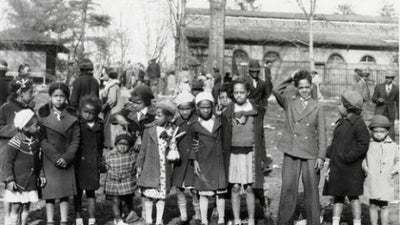
In a remarkable and rare occurrence, Terri “Imani” Turner, a survivor of domestic violence, was released from jail on Wednesday after Chief Magistrate Judge Phinea Aten ruled that the prosecution did not have probable cause to pursue the murder charges against Turner, who had been acting in self-defense.
According to the National Coalition Against Domestic Violence, “more than 40% of Black women have experienced intimate partner physical violence, intimate partner sexual violence and/or intimate partner stalking in their lifetimes. And more than half of Black adult female homicides are related to intimate partner violence.”
On Tuesday, March 28, 2023 in Rockdale County, GA, Turner was almost the victim of such violence and in danger of becoming another statistic.
After enduring years of abuse from her partner, Turner had made the brave decision to leave along with her three youngest children. But, when her partner found out, he held Turner at gunpoint, issuing threats that he would kill both her and her children. In an act of self-defense Imani killed her partner and called the police. When they arrived at the scene, they arrested Turner, who was held in jail until her hearing on April 5, after which she was freed.
Gina Clayton-Johnson, the Executive Director and Founder of Essie Justice Group tells ESSENCE about “the way that Black women showed up for Black women” in a stars-aligning type of moment for Turner’s freedom.
Tanya Miller, the criminal defense attorney for Turner was a Black woman and Judge Aten, who also happened to be a Black woman and the presiding judge over this case, cited a recent study by the National Institute of Justice noting how Black women are often not believed in abuse cases due to the differing ways bruises show up on deeper skin tones.
“I think the judge understood that for Black women, domestic violence and the response to domestic violence looks different by our criminal justice system, and very often Black woman go unprotected,” Clayton-Johnson tells ESSENCE.
She then notes how Judge Aten “spoke to that both in terms of the bruising issue, but also she just talked about stand your ground: ‘Black people, Black women have the right to stand our ground too,’” she says paraphrasing the judge.
“I really thought that was a remarkable uplift of a reality in which property-owning white men and white people are able to defend their land using physical violence. Certainly if that’s the case, then Black women ought to be able to defend their bodies,” Clayton-Johnson continues.
When asked if this would have been the same outcome had the judge not been a Black woman, Clayton-Johnson emphatically replied, “No…I feel so clear about that. I’ve been doing this work for going on 15, almost 20 years in different ways in criminal courts and family courts, working inside of communities who have been heavily impacted by our criminal legal system. We see this kind of thing over and over again, and the outcomes absolutely do not look the same.”
Clayton-Johnson notes the powerful moment for the roomful of Black women gathered together in the Rockdale County Magistrate Court on Wednesday in support of Imani. “It was Black woman that did this, and so I think there’s something really special about the way that we can show up for each other and what a huge difference that can make in our lives.”
Even though Turner was freed two days ago, she still is in limbo, as she awaits the possibility of being indicted by a grand jury.
Hoping to assist with closing this chapter for Turner, Clayton-Johnson has written a letter to the District Attorney pressing for an affirmative commitment of a refusal to seek indictment chargers, so that the Turner family can finally begin the healing process from this horrific ordeal.







